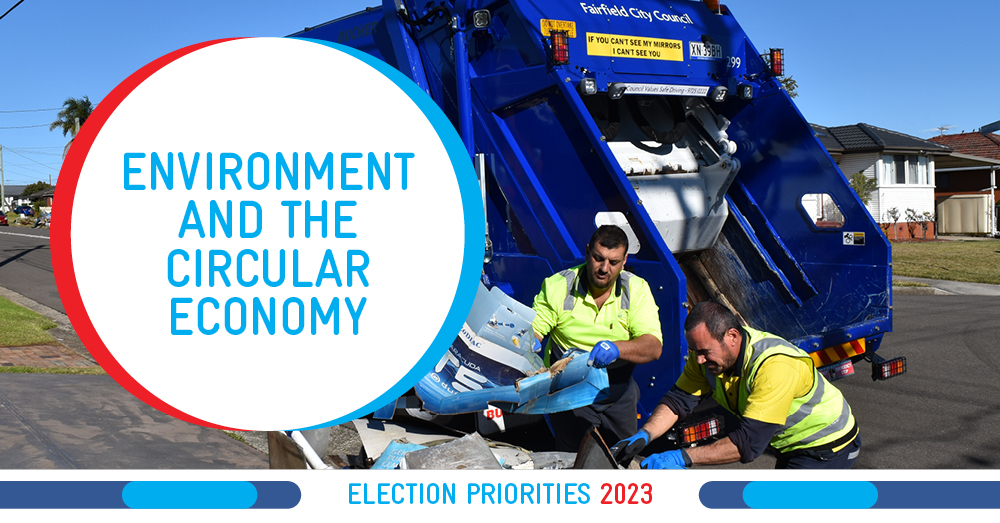
LGNSW election priority focus: Environment and the Circular Economy
Record-breaking floods, bushfires, heat waves and extreme and prolonged drought conditions pose significant risk to communities across NSW and impair the ability of councils to deliver on their responsibilities to communities.
Local governments across NSW continue their calls for urgent action to address the climate crisis.
It is imperative to reduce emissions quickly and adapt our infrastructure and programs to better cope with a changing climate.
Local government is a willing partner in reducing emissions through energy efficiency, investment in renewable energy, fuel replacement, diverting organics from landfill, and community education campaigns. However, there is only so much local action can do to reduce Australia’s greenhouse gas emissions.
The Australian and NSW governments have policy levers to achieve the greenhouse gas emission targets through taxation, regulation of industry and through national construction codes and state planning policies to enact emissions reductions through the entire economy to achieve net zero by 2050.
In the lead-up to the election, we have seen:
- The Coalition announce it would cut greenhouse emissions by 70 per cent by 2035, accelerating its target to achieve net zero.
- The release of the NSW Government Climate Change Policy and Action Plan 2023-26, providing a roadmap to address the causes and consequences of climate change and to work towards net zero emissions by 2050.
- NSW Labor announce it would legislate emissions reductions targets and establish a Net Zero Commission to monitor and review progress.
- NSW Labor announce it would create a $1 billion, state-owned energy security company to drive investment in renewable energy projects and aim to lower prices.
Waste Levy and the circular economy
Councils also face significant challenges from increasing waste generation and lack of markets for Australian recycled content.
All levels of government, as well as business and the community, need to work together as we move to a more circular economy where materials and products remain within the economy for longer and waste is reduced.
The NSW Government expects to collect $783 million in waste levy in 2022/23, and $832 million in 2023/24. At present, much of the waste levy collected is returned to the NSW Government’s general budget, yet it is councils that are expected to deliver many of the State’s actions to increase resource recovery.
Waste levy funds can help support development of technologies and new infrastructure and to foster a transformation to a circular economy.
So far, in response to LGNSW’s election priorities, only the NSW Greens have responded to this specific LGNSW request, by advising they will support redirecting the waste levy collected by the State Government into investments in to the recycling industry to ensure there is demand for recycled material.
Biodiversity Offsets Scheme
The Biodiversity Offsets Scheme has admirable aims but changes are required to improve its functioning and outcomes.
Councils work tirelessly to protect biodiversity, precious habitats and ecological integrity, and must be supported with a practical legislative framework that is fit for purpose and achieves its policy objectives.
For example, an improved scheme would see offsets in the same region experiencing impacts and encourage increased protection of biodiversity while supporting development where it is appropriate.
All spheres of government must work in partnership for a more sustainable future.
It is pleasing that both major parties appear committed to reviewing and addressing concerns with the Biodiversity Offsets Scheme.
For these reasons, LGNSW is calling for all candidates and parties to commit to:
- Introducing policies and programs to achieve the 2030 greenhouse gas emissions reduction target of 50% and the 2050 net zero emissions target.
- Reinvesting 100% of the waste levy to fund the delivery of priority infrastructure and programs as outlined in the Waste and Sustainable Materials Strategy.
- Amending the Biodiversity Offsets Scheme to address barriers to regional development, deliver offsets in the areas experiencing impacts, and improve the quality assurance of accredited assessors.
The three commitments we’re seeking for Environment and Circular Economy are detailed in LGNSW’s 2023 Election Priorities document along with the other nine priority areas.
Councils are also invited to use the resources contained in the Local Government Pre-Election Advocacy Toolkit.
Download LGNSW’s 2023 State Election Priorities
BACK TO NEWS